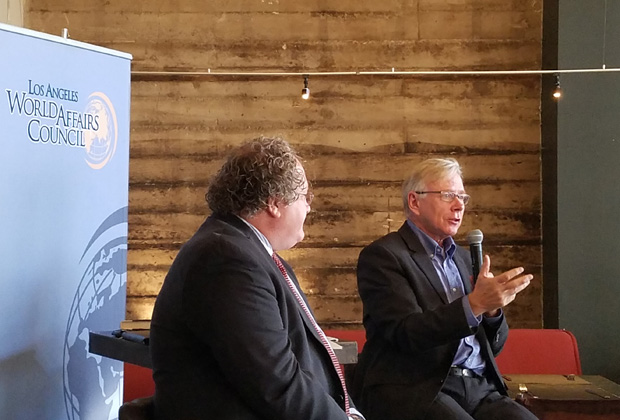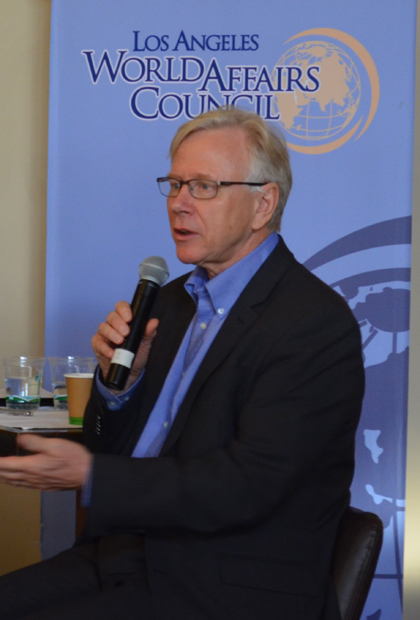 Humphrey Hawksley and Clayton Dube discuss the conflict in the South China Sea.
Humphrey Hawksley and Clayton Dube discuss the conflict in the South China Sea.
In conversation with Clayton Dube, Director of the USC US-China Institute, Humphrey Hawksley analyzed the fault lines and pressure points that might erupt in the cow’s tongue along the nine-dash line, the disputed area in the South China Sea. The strategic region is home to nearly $5 trillion worth of trade and to conflicting claims of sovereignty.
Speaking to a LAWAC Global Café breakfast meeting on October 11th, Hawksley, who has over four decades of experience in the region, assessed the high risk of miscalculation on international waters. China feels like it can edge forward but is still measuring how far it can stretch. While some academics in China are pushing back, Xi Jinping has built a cult of personality around himself, around patriotism, and against the foreign enemy. More importantly, Hawksley noted the Belt and Road Initiative offers a Chinese political and economic alternative model for the world.
 Hawksley reiterated that every Southeast Asian country is facing this conundrum. President Duterte announced the Philippines would not join a US military exercise in the South China Sea but would join the Chinese exercise stating that “Americans lost. Our future lies with China.” In contrast and at 93 years old, the President of Malaysia, Mahatir Mohamad, is standing up to China’s unending debts.
Hawksley reiterated that every Southeast Asian country is facing this conundrum. President Duterte announced the Philippines would not join a US military exercise in the South China Sea but would join the Chinese exercise stating that “Americans lost. Our future lies with China.” In contrast and at 93 years old, the President of Malaysia, Mahatir Mohamad, is standing up to China’s unending debts.
Clayton Dube prompted Hawksley on Taiwan, recounting a recent visit by the President of Taiwan, Tsai Ing-wen, to Los Angeles. Dube also noted that Panama, El Salvador, and the Dominican Republic shifted their diplomatic recognition from Taiwan to China forcing the US to recall its ambassadors in those countries back to Washington. Hawksley emphasized the “focus on Taiwan is because Taiwan is America’s success story. The United States failed in other areas in its attempt to bring western democracy. So are we going to let an autocratic power take it away from us and 23 million people?”
When asked about the possible end of the “Chinese Dream,” Dube asserted, “I wouldn’t bet on a China collapse. Even with a slowdown, China will add an economy the size of Turkey this year.”
China is the rising power. The United States is the status quo power. These powers will invariably conflict. However, China cannot exist without the American global architecture. Hawksley argued that the “idea that you can have a rising autocratic power and not have some kind of confrontation with the US is becoming more acute.”
